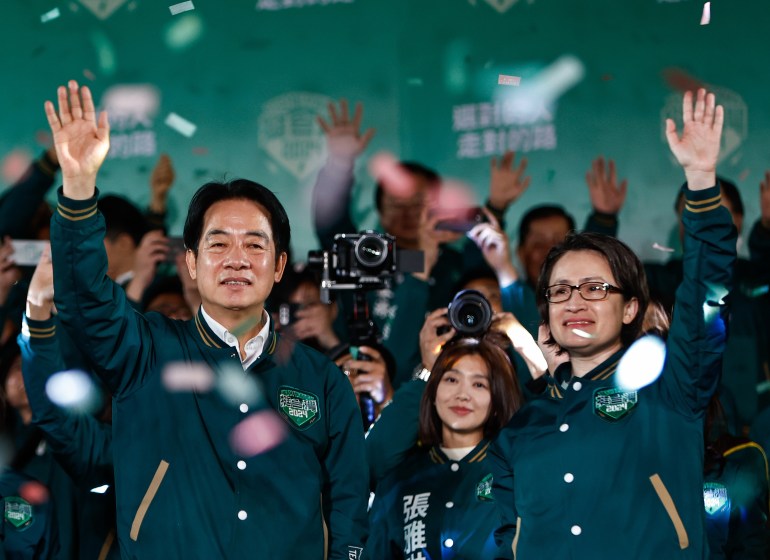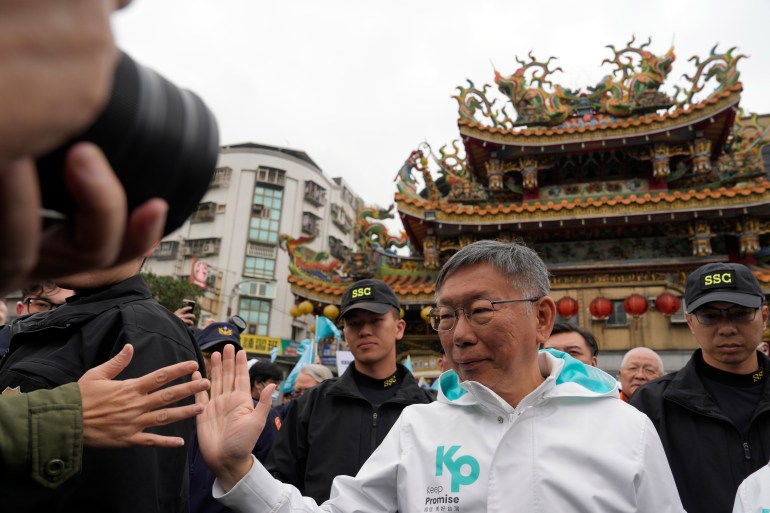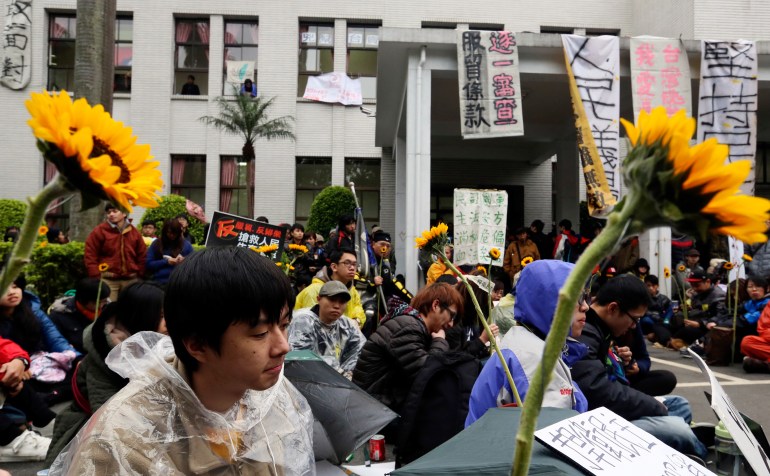Taipei, Taiwan – Eleven years ago, Rex How, writer, publisher, translator, editor, and then-cultural adviser to the Kuomintang (KMT) government of President Ma Ying-jeou, made a decision that would change the direction of his own life, and the future of Taiwan.
On June 20, 2013, How posted a letter on social media alerting the Taiwan public to the planned closed-door signing of the Cross-Strait Service Trade Agreement (CSSTA), a free trade deal that would open up Taiwan’s service industry – which represents about 70 percent of its gross domestic product (GDP) – to Chinese investment.
As the details of the agreement became clear, many in Taiwan’s civil society warned that the deal would advance economic absorption by China and compromise the island’s political sovereignty.
How later resigned and supported student activists nine months later after the bill was rushed through the legislative review process by Ma’s China-friendly KMT. That student movement became what is now known in Taiwan as the Sunflower Movement, or the 318 student movement, commemorating the day the 23-day occupation of the legislature began.
The movement helped pave the way for the Democratic Progressive Party’s (DPP) presidential and legislative victories in subsequent elections and reinvigorated the island’s politics with a new, younger generation of politicians and parties.
But in this year’s election, many former activists and movement parties lost in their districts. Ko Wen-je’s Taiwan People’s Party (TPP), which proved popular among Taiwanese youth as a pragmatic, anti-establishment choice beyond typical political divides, replaced the Sunflower-era New Power Party as the third most-represented party in the legislature with eight seats.

So what has changed in Taiwan since How alerted the public to the CSSTA? In his new book, Taiwan Unbound: A New Chapter, How explains the dissonance between generations in Taiwan as a metaphor for the island nation’s obedient, unmoving mountains and the adaptive, unconfined sea.
How, a child of Chinese immigrants to Korea, moved to Taiwan when he was 18 and built a successful career in the publishing industry. Today, he is the founder of the award-winning publishing house Locus Publishing, chairman of the Taiwan International Book Fair Foundation, and a passionate participant in initiatives across civil society. And despite his support of young activists and his previous tenure under Ma, he says he has no loyalties to any party.
“I’m a citizen. We are the owners of this country,” he said. “So we have to monitor [the government]. Otherwise, who will watch them?”
Al Jazeera spoke with How on the movement’s 10-year anniversary to learn more about contemporary Taiwanese politics and the resonance – or lack thereof – of the Sunflower Movement with Taiwan’s youngest generation.
This interview has been edited for length and clarity.
Al Jazeera: Why did you decide to alert the public about the CSSTA?
Rex How: It was June 2013. I read the newspaper and I found there was news that the government is going to allow mainland China printers to come to Taiwan, they could invest in Taiwan to do printing. So I was very surprised. And at that time, I was the adviser to President Ma Ying-jeou. I never heard that he had such a plan and no one in the government mentioned that they were going to sign a special agreement with China. So I wrote a letter to the president and CC’d the letter to the foreign minister. I told them that it was a totally wrong decision. And it’s very important that I need to talk to them, I want to let them know why it’s so dangerous for Taiwan publishing and even freedom of speech. But I didn’t get any reply from President Ma or anyone in the cabinet.
And then again, I read news that said very soon, our government will open many doors for different areas of Chinese industry to invest in Taiwan. I got so anxious, so I kept asking. And one day I had a talk with the minister of culture at that time with some other publishers. We asked her, what is this agreement about and what is going to happen? And she said even she didn’t know.
And then I spoke with the minister without portfolio and I asked when it was going to be signed. He said in Shanghai, on the evening of the 21st of June of 2013. So I saw that there was nothing I could do. I can only write an article to post on my Facebook and alert the people that there are only 24 hours left for us to express our disagreement with the government. So I wrote that article, and it got a huge response. But it didn’t work. They didn’t listen. So people came out to the streets to protest and that was the beginning of the anti-CSSTA movement.
Al Jazeera: What kind of impact do you think the Sunflower Movement had on Taiwan in the long term?
Rex How: The Sunflower Movement was a summary of all the social movements that happened in Taiwan before. The KMT was the target, but actually, it gathered all the momentum of other social movements in the past years, including the environmental one, including ones about the media, land justice, human rights in the military, and so forth.
So keeping Taiwan’s independence economically from China was on the surface. But at the bottom, in the depths, I recognised that the movement was about a generational gap. The new generation’s acknowledgement of the world, of economics, of Taiwan, everything is different from the generation before. Today after 10 years, the DPP seems to be away from the younger generations. And that’s why Ko Wen-je claims [he is] taking more care of the younger generation.
Al Jazeera: Tell me a little bit about your new book, Taiwan Unbound: A New Chapter.
Rex How: My book started actually 10 or 12 years ago. At that time, I saw that so many social movements began against the government and almost every movement was either initiated or participated [in] by the young people.
At that time, the KMT government [saw] that all these movements against them were supported by the DPP, so they thought that the young people were manipulated by the DPP. But I didn’t agree with that because I watched all these movements evolve. And what I believe is that there’s not a conflict between political parties. There are conflicts between generations.
[I saw] these differences between the generations as a metaphor: the changes on the land seem like the changes of the mountain and valley, the desert and grass. The mindset is different from mountain to valley, from grass to desert, but they have something in common: They are on the land. Until a certain point in time, that was the difference between every generation. But at a certain point, the changes of the generations become totally different. So I use metaphors like from land to sea. I saw that in Taiwan that point of time was 1987 because that year, we lifted martial law and Taiwan became a democratic society or country.

The meaning of the lifting of martial law is the media became free – we had newspapers booming, TV stations, cables and especially radio stations. We can hear, we can listen, you can watch and you can read so many things that were taboo, that were prohibited before. So it’s a completely different world, Taiwan after 1987. I thought people born after that were like people in the sea. The way to live and survive in the sea is different from the way to live and survive on the land. On the land, you have to exercise your legs. But in the sea, you have to learn how to swim, how to sail a boat, not only to run up the hills or walk in the desert. So since 10 years ago, I felt all these kinds of protest movements have happened in the sea.
So the real thing is how to listen to these kinds of voices, which were different from the previous generations’; how to acknowledge their needs, how to acknowledge their anger. The KMT didn’t notice this. They didn’t accept this, they only thought that all these young generations were risen by the DPP. So eight years ago, in the election, they just collapsed. They had a big loss to the DPP at that time.
Al Jazeera: 10 years after the Sunflower Movement, many members of [the post-Sunflower movement party] New Power Party (NPP) joined the DPP. And in this election, the DPP tried to present itself as representing the young people by running these Sunflower-era politicians. And they weren’t all successful. Do you think now there’s even a disconnect between the Sunflower generation and the new young generation?
Rex How: Yes. If we continue to use my metaphor of land and sea, 10 years ago, the sea was shallow. But after eight years, after two elections, there is a deeper sea. People born after the year 2000 are different from the people who were born in 1987 like [those in the] Sunflower Movement.
Al Jazeera: So they are harder to reach?
Rex How: They are different. Just like Lin Fei-fan [a former Sunflower Movement leader] told me, he doesn’t understand what young people under 30 are thinking because they are using different media. KMT, they use media like newspapers or TV; DPP, Sunflower Movement, the main media they use are blogs and Facebook. Today, young people are not using blogs and Facebook, they’re using IG, YouTube, short videos, TikTok. When you are using different media that means that you are in a different world … in my metaphor, young people are in the deep sea, and they are crying for help that someone could help them to sail a boat, help them survive in the sea. And nobody came to them besides Ko Wen-je.

All the other candidates didn’t show [up] in the media that they are using. What Ko Wen-je did was sail a boat to the deep ocean, but he kept on changing his costumes to play different roles. You never know who he really is, what he really believes. What he said in the evening is different from the morning. Sometimes he says [President] Tsai Ing-wen is a troublemaker, but sometimes he says he will follow her diplomatic policies. But for the young people, he is the only candidate that they can reach, they can see, they can watch. And the tactics of Ko Wen-je are very clever. In my book, I mentioned that he hired six to seven YouTubers to help him decide what he would say today. The only thing he is thinking about is volume on the internet. So he doesn’t mind if he’s saying something different. As long as the volume can be raised, he’s happy to do that.
Al Jazeera: Do you think that is enough for the TPP to stay relevant in politics? He also campaigned on being this anti-establishment figure. But now, the TPP has eight seats in the legislature. They’re becoming part of the establishment, and they’re going to have to define their values and vote on things. Maybe that will turn some voters away because they heard him say something different?
Rex How: As you saw, Ko got the least votes in Taipei City. So all the citizens in Taipei, they knew what he did, who he was. So he can only mesmerise people outside of Taipei. There is a saying that “all of the Ko haters were once Ko fans”.
I don’t know if he will last. I only know that I don’t think it’s really a party. It’s a one-man party or one-man show of Ko Wen-je. In the long run, I really don’t think [the TPP will last] because of Ko Wen-je’s mindset, he has an emperor’s mindset. He admires Mao Zedong – you know that, right? And when he got elected the first time 10 years ago as Taipei mayor, he went on a pilgrimage to Yan’an. He has a very friendly mindset toward China.
Al Jazeera: There haven’t been many big student movements in the past several years. There hasn’t really been something similar to what happened in Hong Kong in 2019, or in Taiwan in 2014, this kind of immediate existential threat to Taiwan, unlike during the Sunflower Generation. Do you think that may have also helped Ko Wen-je and hurt the DPP?
Rex How: People are very easy to forget. So some young people today, maybe they forgot, or they even didn’t know what happened in Hong Kong four years ago. Another reason is that because the DPP won the election four years ago by elaborating on this point, some people are criticising them like hey, you don’t know anything else, maybe the DPP is good at using kind of fears but they didn’t pay that much attention to the young generation.
But I think that’s a mistake. We should always let people know that every election in Taiwan is related to China. There is always an invisible candidate – China – that’s always invisible but participating. Twenty years ago, in 1996, they used bombs, missiles to threaten us. And then they tried to use the money to buy us like what they did in Ma Ying-jeou’s government. And now, they’re using cognitive warfare. Cognitive wars were omnipresent in this election.